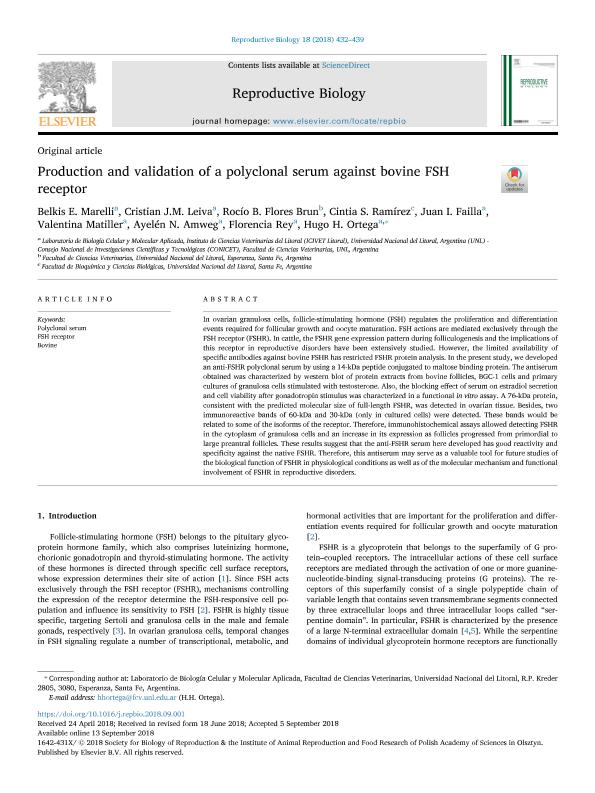Mostrar el registro sencillo del ítem
dc.contributor.author
Marelli, Belkis Ester

dc.contributor.author
Leiva, Cristian Jesus Manuel

dc.contributor.author
Flores Brun, Rocío B.
dc.contributor.author
Ramírez, Cintia S.
dc.contributor.author
Failla, J.I.
dc.contributor.author
Matiller, Valentina

dc.contributor.author
Amweg, Ayelen Noelia

dc.contributor.author
Rey, Florencia

dc.contributor.author
Ortega, Hugo Hector

dc.date.available
2019-10-18T18:58:11Z
dc.date.issued
2018-12
dc.identifier.citation
Marelli, Belkis Ester; Leiva, Cristian Jesus Manuel; Flores Brun, Rocío B.; Ramírez, Cintia S.; Failla, J.I.; et al.; Production and validation of a polyclonal serum against bovine FSH receptor; Inst Animal Reproduction Food Research; Reproductive Biology; 18; 4; 12-2018; 432-439
dc.identifier.issn
1642-431X
dc.identifier.uri
http://hdl.handle.net/11336/86441
dc.description.abstract
In ovarian granulosa cells, follicle-stimulating hormone (FSH) regulates the proliferation and differentiation events required for follicular growth and oocyte maturation. FSH actions are mediated exclusively through the FSH receptor (FSHR). In cattle, the FSHR gene expression pattern during folliculogenesis and the implications of this receptor in reproductive disorders have been extensively studied. However, the limited availability of specific antibodies against bovine FSHR has restricted FSHR protein analysis. In the present study, we developed an anti-FSHR polyclonal serum by using a 14-kDa peptide conjugated to maltose binding protein. The antiserum obtained was characterized by western blot of protein extracts from bovine follicles, BGC-1 cells and primary cultures of granulosa cells stimulated with testosterone. Also, the blocking effect of serum on estradiol secretion and cell viability after gonadotropin stimulus was characterized in a functional in vitro assay. A 76-kDa protein, consistent with the predicted molecular size of full-length FSHR, was detected in ovarian tissue. Besides, two immunoreactive bands of 60-kDa and 30-kDa (only in cultured cells) were detected. These bands would be related to some of the isoforms of the receptor. Therefore, immunohistochemical assays allowed detecting FSHR in the cytoplasm of granulosa cells and an increase in its expression as follicles progressed from primordial to large preantral follicles. These results suggest that the anti-FSHR serum here developed has good reactivity and specificity against the native FSHR. Therefore, this antiserum may serve as a valuable tool for future studies of the biological function of FSHR in physiological conditions as well as of the molecular mechanism and functional involvement of FSHR in reproductive disorders.
dc.format
application/pdf
dc.language.iso
eng
dc.publisher
Inst Animal Reproduction Food Research

dc.rights
info:eu-repo/semantics/openAccess
dc.rights.uri
https://creativecommons.org/licenses/by-nc-sa/2.5/ar/
dc.subject
POLYCLONAL SERUM
dc.subject
FSH RECEPTOR
dc.subject
BOVINE
dc.subject.classification
Otras Ciencias Veterinarias

dc.subject.classification
Ciencias Veterinarias

dc.subject.classification
CIENCIAS AGRÍCOLAS

dc.title
Production and validation of a polyclonal serum against bovine FSH receptor
dc.type
info:eu-repo/semantics/article
dc.type
info:ar-repo/semantics/artículo
dc.type
info:eu-repo/semantics/publishedVersion
dc.date.updated
2019-10-18T18:44:11Z
dc.journal.volume
18
dc.journal.number
4
dc.journal.pagination
432-439
dc.journal.pais
Polonia

dc.description.fil
Fil: Marelli, Belkis Ester. Consejo Nacional de Investigaciones Científicas y Técnicas. Centro Científico Tecnológico Conicet - Santa Fe. Instituto de Ciencias Veterinarias del Litoral. Universidad Nacional del Litoral. Facultad de Ciencias Veterinarias. Instituto de Ciencias Veterinarias del Litoral; Argentina
dc.description.fil
Fil: Leiva, Cristian Jesus Manuel. Consejo Nacional de Investigaciones Científicas y Técnicas. Centro Científico Tecnológico Conicet - Santa Fe. Instituto de Ciencias Veterinarias del Litoral. Universidad Nacional del Litoral. Facultad de Ciencias Veterinarias. Instituto de Ciencias Veterinarias del Litoral; Argentina
dc.description.fil
Fil: Flores Brun, Rocío B.. Universidad Nacional del Litoral; Argentina
dc.description.fil
Fil: Ramírez, Cintia S.. Universidad Nacional del Litoral. Facultad de Bioquímica y Ciencias Biológicas; Argentina
dc.description.fil
Fil: Failla, J.I.. Universidad Nacional del Litoral. Facultad de Bioquímica y Ciencias Biológicas; Argentina
dc.description.fil
Fil: Matiller, Valentina. Consejo Nacional de Investigaciones Científicas y Técnicas. Centro Científico Tecnológico Conicet - Santa Fe. Instituto de Ciencias Veterinarias del Litoral. Universidad Nacional del Litoral. Facultad de Ciencias Veterinarias. Instituto de Ciencias Veterinarias del Litoral; Argentina
dc.description.fil
Fil: Amweg, Ayelen Noelia. Consejo Nacional de Investigaciones Científicas y Técnicas. Centro Científico Tecnológico Conicet - Santa Fe. Instituto de Ciencias Veterinarias del Litoral. Universidad Nacional del Litoral. Facultad de Ciencias Veterinarias. Instituto de Ciencias Veterinarias del Litoral; Argentina
dc.description.fil
Fil: Rey, Florencia. Consejo Nacional de Investigaciones Científicas y Técnicas. Centro Científico Tecnológico Conicet - Santa Fe. Instituto de Ciencias Veterinarias del Litoral. Universidad Nacional del Litoral. Facultad de Ciencias Veterinarias. Instituto de Ciencias Veterinarias del Litoral; Argentina
dc.description.fil
Fil: Ortega, Hugo Hector. Consejo Nacional de Investigaciones Científicas y Técnicas. Centro Científico Tecnológico Conicet - Santa Fe. Instituto de Ciencias Veterinarias del Litoral. Universidad Nacional del Litoral. Facultad de Ciencias Veterinarias. Instituto de Ciencias Veterinarias del Litoral; Argentina
dc.journal.title
Reproductive Biology

dc.relation.alternativeid
info:eu-repo/semantics/altIdentifier/doi/http://dx.doi.org/10.1016/j.repbio.2018.09.001
Archivos asociados
